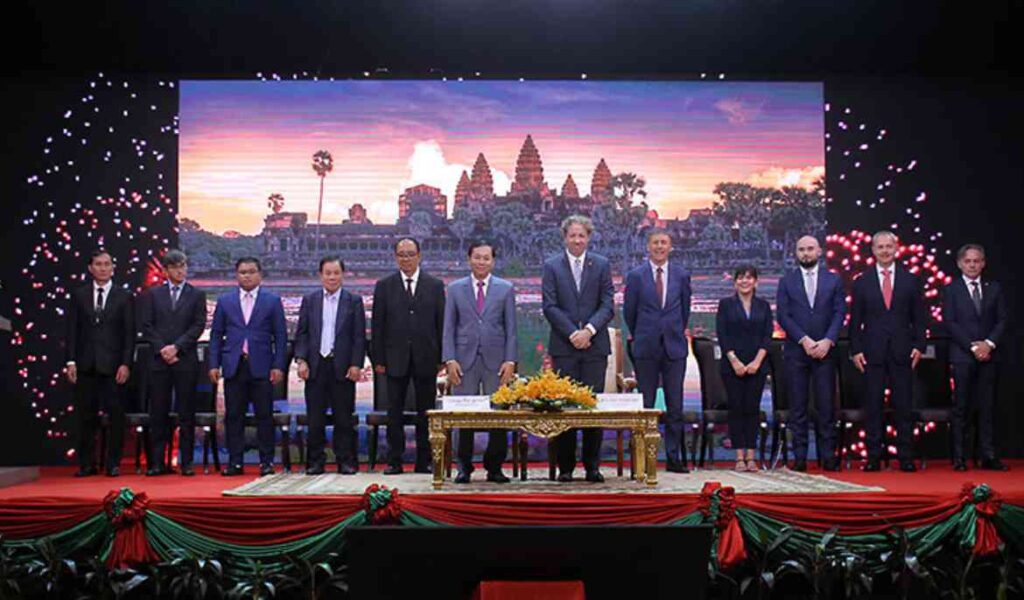The European Union (EU) and Cambodia officially launched the EU Twinning Project with the National Institute of Statistics (NIS) titled “Enhancing the Quality of the Statistics System in Cambodia in Phnom Penh yesterday.
The event was attended by EU Ambassador to Cambodia Igor Driesmans and the Minister of Planning (MoP), Bin Trachhey, with Team Europe representatives from Italy, France, Poland and other participants, totalling around 200 people.
The EU Twinning Instrument is a tool used by the EU to support institutional cooperation between public administrations of EU member states and beneficiary or partner countries.
The project financed by the EU is the first twinning project implemented in Cambodia and in Asia. Implemented by a consortium of four EU member states led by Italy (Istat), the project includes France (INSEE), Poland (Statistics Poland), and Lithuania (State Data Agency) as MS Junior Partners, with the Italian Geographical Society (SGI) serving as the technical partner.
The project aims to support the quality and international comparability of the Cambodian official statistics and at improving the National Statistical System (NSS) of Cambodia through strengthening the institutional capacity of the NIS for collecting, processing and disseminating statistical products.
The project also aims to formally introduce and initiate a cooperative programme between Cambodia’s NIS and the EU member states.
Speaking at the event, the EU ambassador explained this first-of-its-kind EU initiative in Cambodia and Asia. The initiative creates a platform for peer-to-peer knowledge sharing and technical expertise between Cambodian and European statistical institutions.
“This institutional collaboration offers practical knowledge and best practices in areas such as regulatory and institutional frameworks, data infrastructure and technology, data quality standards, and professional development for statisticians,” said the ambassador.
He emphasised the importance of official statistics for good governance, evidence-based policy-making, and sustainable development. He called on the Cambodian government to invest further in this sector, given its pivotal role for transparency and informed decision-making.
Trachhey underscored the government’s commitment to inclusive and high-quality statistics.
“The National Institute of Statistics plays a vital role in supporting the government’s data-driven and evidence-based policymaking,” he said. “This is crucial for development directions to be appropriate, context-specific, and meet the real needs of the Cambodian people, in line with the ‘leave no one behind’ principle.”
In a pre-recorded video message, Francesco Maria Chelli, President of the Italian National Institute of Statistics and leader of the Twinning consortium, lauded the collaborative efforts and pledged the consortium’s commitment to sharing Europe’s expertise in official statistics with Cambodia.
“Through this partnership, we are investing in a resilient statistical infrastructure for Cambodia and creating a legacy of knowledge sharing and mutual growth that will last well beyond the timeframe of this project,” said Chelli.
Dominik Rozkrut, President of Statistics Poland, emphasised the significance of the first Fundamental Principle of Official Statistics, “Relevance, Impartiality, and Equal Access,” highlighting the role of unbiased information in helping society make decisions, understand itself, and monitor key economic, social and environmental processes. He stressed the importance of serving all users equally, ensuring no privileges in access to information.
He added that global statistical harmonisation is essential for generating internationally comparable data, which also promotes cross-country understanding.
The event also featured a panel discussion highlighting EU and Cambodian experiences and practices in the key areas of National Statistical System Coordination and Data Exchange, System of National Accounts, and Career Development for Official Statisticians. These topics align with the focus areas and results of the Twinning Project.



